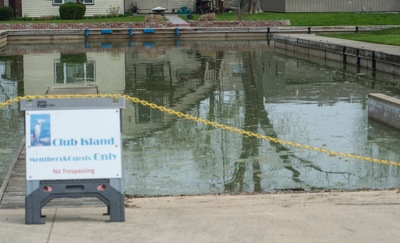Wednesday, April 20th, 2016
People pack meeting opposing chicken farm
Residents fear worsened lake water quality, wells going dry, more traffic
By Nancy Allen

Photo by Mark Pummell/The Daily Standard
About 150 people gather Tuesday night at the Mercer County Central Services Building in Celina for a public hearing concerning a proposed 1.69 million cage-free layer-hen operation WDC Egg officials want to build northeast of St. Henry. The forum was organized by the Ohio Department of Agriculture.
CELINA - About 150 people attended a contentious public hearing in Celina Tuesday night, most to protest a 1.69 million cage-free layer-hen operation proposed on Fleetfoot Road northeast of St. Henry.
Twenty-three people spoke against WDC Eggs LLC, which was formed by Cooper Farms Inc., Weaver Brothers Inc. and Division Farms LLC. An environmental attorney representing the proposed facility was the only person to speak in its favor.
The Ohio Department of Agriculture may host public hearings for draft permits to install and operate before the facility can be approved.
Most of the concerns centered around fears of worsened water quality in Grand Lake, wells going dry, increased traffic and a degraded quality of life. The facility would be located in the Grand Lake Watershed.
Tim Lovett, president of the 1,200-member Lake Improvement Association, said it would be "irresponsible" to allow the operation in the watershed, which has been designated distressed by the state.
"The lake is full of nutrients," Lovett said. "That adding more animals makes sense is incomprehensible."
The lake was labeled distressed in 2011 after humans and animals were sickened by blue-green algal toxins in the lake in 2010. A massive, stench-producing algal bloom also enveloped the lake in 2010. Toxin levels were so high the state issued a no-contact water advisory, halting lake use and causing area businesses to lose money. OEPA studies show most of the nutrients that flow into the 13,500-acre lake come from farmland, the largest land use in the 58,000-acre livestock-heavy watershed.
Lake Restoration Commission Manager Milt Miller compared the proposed operation to an industrial facility and called it a "slap in the face" to those trying to help the lake. The LRC plans to appeal the permits, if necessary, to the Environmental Review Appeals Commission, he said.
The farm's draft permit to install calls for building 16 layer-hen barns, an onsite egg-processing facility, three egg-wash manure lagoons and two manure storage barns. The processing facility would produce roughly 2.15 million gallons of liquid egg-wash manure water annually. The liquid would be stored in an interconnected, three-stage pond system that could hold 2.37 million gallons, equal to about 400 days of storage. The farm would generate about 48,000 tons of poultry manure annually.
ODA officials said the manure would be moved out of the watershed to manure brokers and farmers. The liquid egg-wash manure water would be applied on 17 acres of ground around the operation on a rotating alfalfa crop, the draft permit to install says. Plans also are in place to control insects and rodents and dispose of dead birds.
Mercer County Economic Development Director Jared Ebbing said a water resource study is needed. The amount of water the facility would use per day - 100,000 gallons - is equal to the amount used by the village of Fort Recovery, he noted.
"Coopers is a fantastic company and this is a fantastic potential project, but at this time because of the watershed issue and because of the uncertainty of water resources, it makes it problematic for the long-term future of our communities," he said. "In Coldwater and St. Henry, what will it look like in five or 10 years if there is not enough water to go around? Without an actual study, we simply don't know."
Several people living near the site said they feared they would not have enough water for their livestock.
"Cooper has served the community well, but you will put distress on the residents of Coldwater and St. Henry and Grand Lake," said Donna Wuebker. "Our cows need water. What are we going to do if our well goes dry?"
Craig Moeller, who lives across the road from the proposed facility, agreed and called for a study to ensure farmers' and residents' wells would not be affected.
"When does my quality of life come into play?" asked Christine Hannewald, who lives a mile north of the site. "And what about Grand Lake? There are a number of farmers working to help the lake. How will a 1.7 million chicken farm not have an impact on Grand Lake?"
Jack Van Kley, an environmental attorney representing WDC Eggs, said the operation would be state of the art and would not harm the community. In addressing crowd concerns about odor and flies, Van Kley said steps would be taken if those issues were to arise.
"You know the families involved," he said. "They are outstanding members of the community, and they will continue to represent this community. If any problems arise, they will address them."
Van Kley said the egg-wash manure water would be "very dilute" at the end of the three-pond treatment process and that alfalfa fields around the proposed facility where the water would be applied would easily handle the liquid.
If area wells are impacted by the facility, WDC and Cooper Farms would "make it right," Van Kley said
"We want it in writing," an angry woman shouted back at him.
Many people who commented spoke longer than the three minutes allotted, refusing to yield when ODA officials said their time was up. The meeting was punctuated by applause after several speakers' comments.
Even after the ODA formally closed the 90-minute hearing, it continued, with several people grilling Van Kley.
Answers to questions posed during the hearing and answers submitted to the ODA during a public comment period that ends 5 p.m. April 26 will be sent to individuals in a responsiveness summary, said Kevin Elder, chief of the ODA's Livestock Environmental Permitting Program. Comments can be delivered or mailed to ODA Division of Livestock Environmental Permitting, 8995 E. Main St., Reynoldsburg, OH 43068 through April 26.
Appeals to the draft permits can be sent to ERAC at 77 S. High St., 17th Floor, Columbus, OH 43215.
During the history of its permitting program, the ODA has denied one permit for a poultry facility in Union County that he is aware of, ODA spokesman Brett Gates said this morning.





